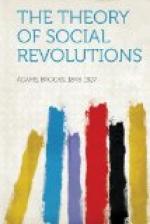All this elaborate introduction was in the nature of a solemn lecture by the Chief Justice of the Supreme Court to the President of the United States upon his faulty discharge of his official duties. Having eased his mind on this head, Marshall went on, very dexterously indeed, but also very palpably, to elude the consequences of his temerity. He continued: The right of property being established, and the violation of that right clear, it is plain that a wrong has been committed, and it only remains to determine whether that wrong can be redressed under this form of procedure. We are of opinion that it cannot, because Congress has no constitutional power to confer upon the Supreme Court original jurisdiction in this class of litigation. In the lower courts alone can the relief prayed for be obtained.
Of all the events of Marshall’s life this controversy with Jefferson seems to me the most equivocal, and it was a direct effect of a constitutional system which has permitted the courts to become the censor of the political departments of the government. Marshall, probably, felt exasperated by Jefferson’s virulence against these final appointments made by John Adams, while Marshall was Secretary of State, and for which he may have felt himself, in part, responsible. Possibly, even, he may have taken some of Jefferson’s strictures as aimed at himself. At all events he went to extreme lengths in retaliation. He might have dismissed the litigation in a few words by stating that, whatever the abstract rights of the parties might have been, the Supreme Court had no power to constrain the President in his official functions; but he yielded to political animosity. Then, having taken a position practically untenable, he had to find an avenue of retreat, and he found it by asserting a supervisory jurisdiction over Congress, a step which, even at that early period, was most hazardous.[12]
In reality Jefferson’s temper, far from being vindictive and revolutionary, as his enemies believed, was rather gentle and timid, but he would have been more than mortal had he endured such an insult in silence. Nor could he, perhaps, have done so without risking the respect of his followers. So he decided on reprisals, and a scheme was matured among influential Virginians, like John Randolph and Senator William Giles, to purge the Supreme Court of Federalists.




